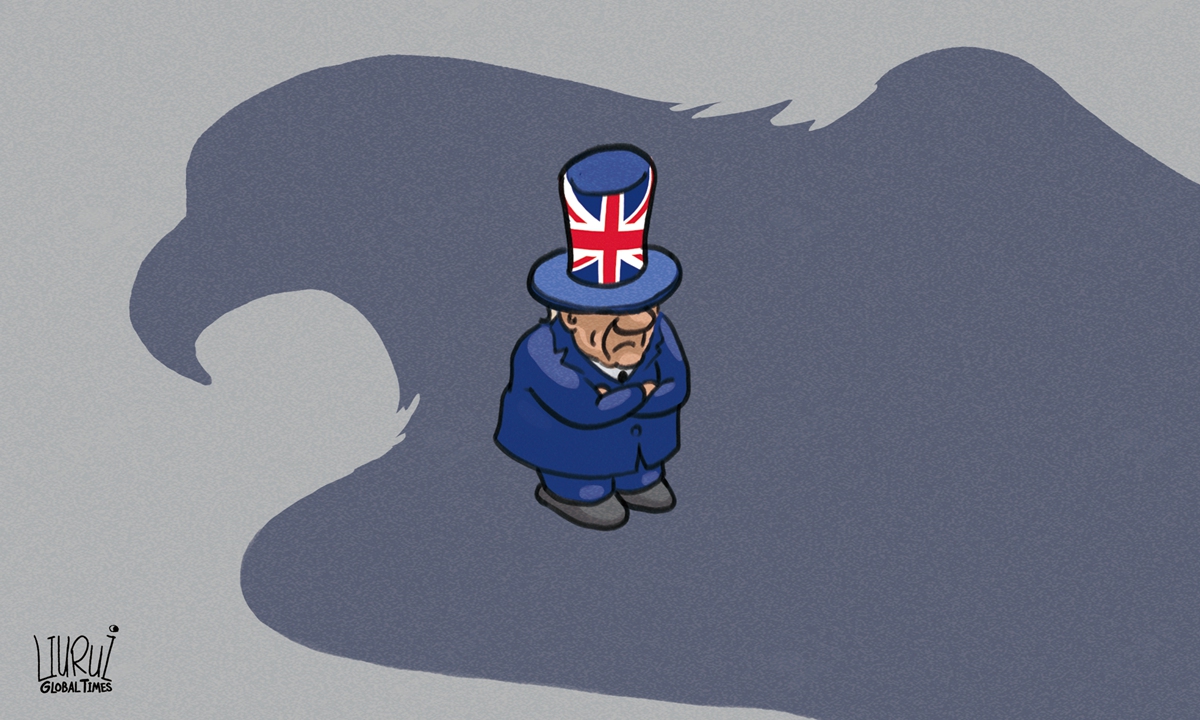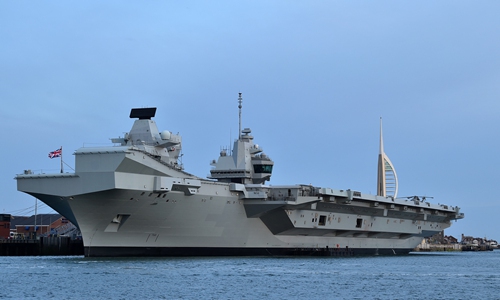
Graphics: Liu Rui
When the UK Carrier Strike Group is visiting the Indo-Pacific region, the Washington Examiner on Friday published an article, saying, "The question of whether the 'special relationship' between Britain and the US is truly all that special… much depends on a 12-mile test in the South China Sea - more specifically, whether or not Prime Minister Boris Johnson sends a British warship within 12 miles of artificial Chinese territory."The US has been instigating its allies to stir up trouble in the South China Sea in recent years. This article by the Washington Examiner is even more blatant in urging Britain to send a warship within 12 miles of Chinese territories. It can be concluded that the US is the biggest destroyer of peace and stability in the South China Sea.
The term "special relationship" was coined by former prime minister Winston Churchill after WWII. And it has been used to describe the unique alliance between the US and Britain. In recent years, some analysts have questioned whether their "special relationship" could continue.
US President Joe Biden chose the UK as the destination of his first overseas trip, and he issued a statement pledging to affirm the "special relationship" with the UK when he met Johnson in June. This embodies the US' intention to strengthen its "special relationship" with Britain. When the US sees China as its top rival, it is roping in all its allies, including the UK, to counter China.
From the perspective of the UK, after Brexit, the country hopes to increase its influence on global affairs by leveraging its special relations with the US. London has more pressing needs to underline its "special relationship" with Washington, and London's strategic demand for the US is rising.
"Against this backdrop, the US has the initiative. As a result, how special US-UK relations are depends on Britain's performance. Washington also intends to exploit London as cannon fodder to test China's reaction," Wang Yiwei, director of the institute of international affairs at the Renmin University of China in Beijing, told the Global Times.
In a bid to respond to US' Indo-Pacific strategy, the UK planned to deploy its Carrier Strike Group to the Indo-Pacific region between July and October, and the country on Tuesday affirmed that it will sail the carrier task force through the South China Sea in August. On the same day, Britain also said it would permanently deploy two warships in Asian waters, according to Reuters.
However, sending a warship within 12 miles of Chinese territory is a direct challenge to China's core interests, which might result in misjudgment. Even the US' closest allies are not willing to follow the US in this regard. The article in the Washington Examiner also complained that "top US allies have been reluctant to do the same [conducting the so-called freedom of navigation operations within 12 miles of Chinese territories in the South China Sea]." These allies the article listed include the Philippines, Australia, Japan, France, Germany and New Zealand.
Wang noted, "The UK has always been wily, and it will not easily confront China, or directly provoke China. London is expected to be very prudent on whether to send a warship within 12 miles of Chinese territories in the South China Sea. Under the US' repeated incitement, Britain might merely carry out some symbolistic practices, to satisfy US needs without unduly antagonizing China."
Washington has repeatedly emphasized that China is its top competitor and it seeks to "decouple" with China and engage in a new cold war with China. But US' allies including the UK do not have the desire of "decoupling" and engage in new cold war with China. US allies' markets are highly dependent on China. And these countries also worry that if they get too close to the US and unduly provoke China, whether the US will protect themselves. It is not uncommon for the US to betray its allies for pursuing its own interests, exposing its self-serving nature. In this context, US' allies are reluctant to closely tie themselves into US' anti-China chariot.


